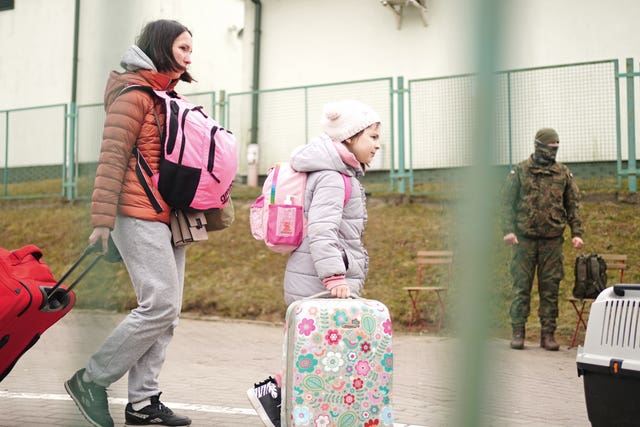Government’s Homes for Ukraine scheme hard to understand, says refugee charity
Refugees At Home co-founder Sara Nathan said the ‘detail is sketchy’ and she did not know what safeguards were being put in place.

A charity that places refugees with volunteer hosts in the UK has asked for “clarity” from the Government after describing the detail of its Homes for Ukraine scheme as “sketchy”.
Refugees At Home co-founder Sara Nathan said her charity has no official involvement with the Government scheme, which allows people to volunteer rent-free accommodation to host Ukrainians fleeing the Russian invasion.
But after representatives of the charity attended meetings with officials, Ms Nathan said she was not clear on the detail of exactly how the scheme would work.
“The Government scheme is the stuff we don’t really understand yet, and I don’t think it’s us being thick,” she told the PA news agency.
“The detail is sketchy, and of course what we’re getting is desperate Ukrainians getting in touch with us via our website, via our social media saying, ‘Who’s going to sponsor me? How can you get me out?’
“And the answer is, ‘Well, I don’t know’.”
The charity employs seven people but hopes to boost that number to 15 by next week to help deal with the huge increase in applications it is receiving.
It has placed more than 2,600 guests for a total of over 200,000 nights since it was founded in 2015, and Ms Nathan hopes the expertise it has built up can be of use.
The charity performs checks on every host, including mandatory home visits, before a placement is made.
Ms Nathan said she would like to know what safeguarding is being put in place to ensure the Government scheme runs smoothly for all involved.
She said: “Is everyone going to treat them well? Most people are, but what about the ones that don’t?
“Have you done anything to try and prevent exploitation and abuse? I don’t know. We feel we have to do more than nothing to do that.

“And there’s also the question of what do you do if a placement doesn’t work. And it may not work not because anyone’s nasty – it doesn’t always work.
“It’s a minimum of six months – it’s quite a big ask.
“And maybe people will do it and maybe people are going to be that enthusiastic for that length of time – but I don’t know.”
Ms Nathan pointed out that some of those arriving in the country are likely to be “really quite traumatised” and some may have come “straight from a warzone”.
She said: “Is there any support for that? Is there any support for the host who finds their guest has PTSD, anxiety, depression?
“I don’t know whether there’s any support.”
Speaking in the House of Commons on Monday, Communities Secretary Michael Gove said he wanted to work with charities, churches and community groups to ensure anyone arriving from Ukraine has the right support.
“We want to ensure that we are working with all of them this week to facilitate their role, not just in matching individual sponsors and Ukrainians who might benefit but in extending the reach of the support we give so that it is not just a roof over someone’s head but the valuable interpersonal support of which so many are capable,” he said.
Ms Nathan said it was “very difficult” for the Government, and applauded the intent to make changes to a system which left thousands of Afghan refugees accommodated in hotels for months after they fled the Taliban last year.
“I do quite understand why they’re going down a different route,” she said. “It’s completely understandable.
“That was not the way to treat people and to arrange anything.
“So going for something different is a good idea in many ways if you can do it right.”
But she suggested the UK was “introducing unnecessary complexities” to the process compared with other countries in Europe.
“We could have done a visa waiver like the EU did and then made ourselves cope,” she said.
“We are being quite complex.
“If we had just done the visa waiver, people would come or not come and we would have sorted it out.”
Ms Nathan compared the system with Ireland, where she said refugees can arrive with just an ID card and “they’ve got people at the airport to meet you”.
She said: “They are treating people in a different way.
“And if it was me running the world, I’d want to do it like that.”





